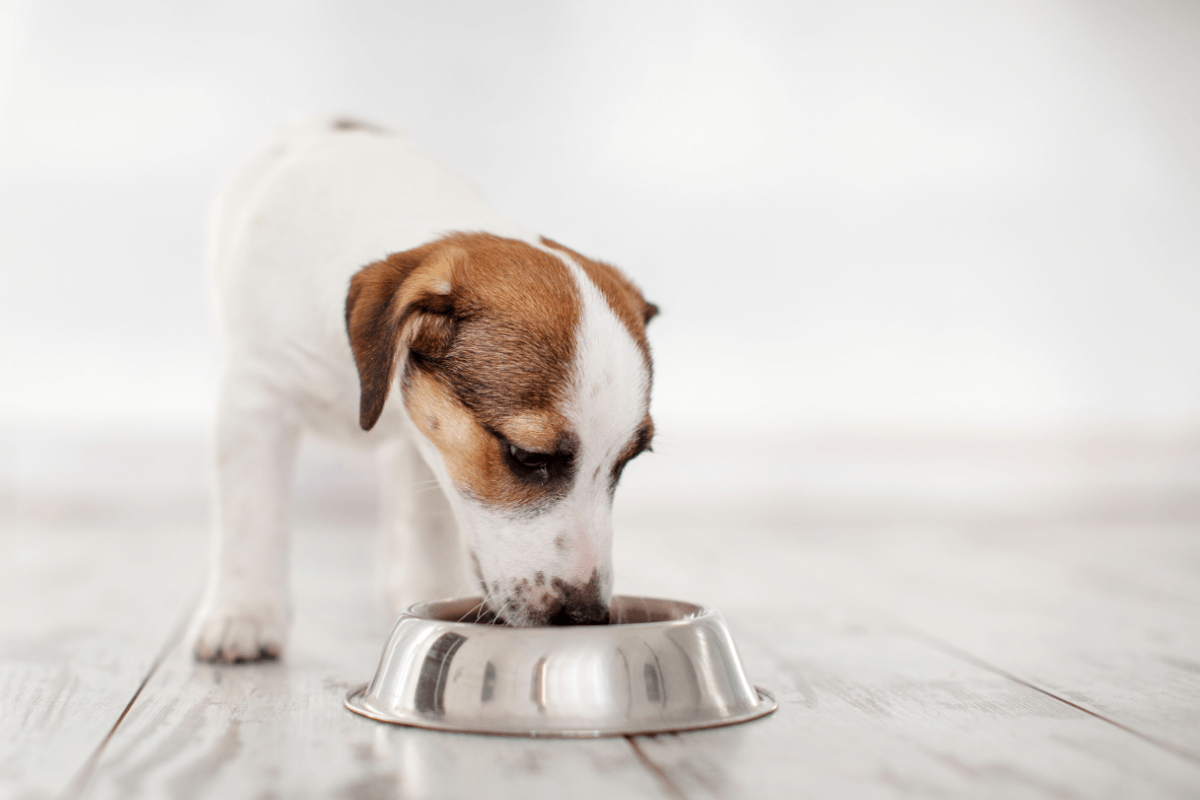Welcoming a new puppy into your home is an exciting time, but it also comes with a lot of questions, particularly about their diet.
Should you feed them puppy food or just small amounts of dog food? How much do I feed them? What about a raw food diet? In this blog, we answer these questions and more to help you understand what to feed your puppy.
Meeting the nutrition needs of your puppy
Puppies grow rapidly, and their nutritional needs are different from adult dogs. They require more protein, fat, and specific nutrients to support healthy growth, bone development, and overall health. This is why you should feed your puppy food that has been specifically formulated for their young bodies until they are at least 12 months old. Large breed puppies may even need puppy food until 15 or 18 months of age, depending on their size.
When selecting puppy food, look for food that is balanced and complete, meaning it provides all the necessary nutrients your puppy needs. Additionally, check if the food has undergone feeding trials to ensure its efficacy.
The size and any medical conditions of your puppy should also be taken into consideration. Large breed puppies, for example, should be fed a special diet that promotes controlled growth to prevent skeletal and joint issues. Consulting with your vet is highly recommended to determine the best food options for your puppy’s unique needs.
For clients at our small animal vet clinic, we tend to recommend Hills and Royal Canin pet foods. These brands provide a complete, balanced diet and have a money-back guarantee if your pet doesn’t like it.
What about a home-made or raw food diet?
When it comes to feeding your puppy, it’s important to understand their nutritional needs and provide them with a diet that supports their growth and development. A completely homemade or raw food diet is very difficult to make ‘complete and balanced’ and can deprive or oversupply your puppy of important vitamins and nutrients.
Additionally, raw meat can also put your puppy at risk of developing bacterial and parasitic infections that can make your dog seriously ill and even compromise the health of people in your household.
For these reasons we do not recommend raw feeding or a solely home-made diet, however, if you do choose to do so, we strongly recommend consulting a board-certified veterinary nutritionist to ensure the diet your puppy is receiving contains all that they need to help them grow into a strong and healthy adult dog.
The ins and outs of feeding your puppy

- Either start with the food or transition gradually
When you bring your new puppy home, if possible, it’s best to start them on the same food the breeder or carer was providing. This helps to maintain consistency and prevent any digestive issues. If you want to switch to a new food, do it gradually over 7 to 10 days by mixing increasing amounts of the new food with the old food.
- Stick to one brand and follow feeding guidelines
Choosing the right puppy food can be overwhelming, but it’s important to stick to one brand of dry food for consistency. This helps to avoid any sudden changes that may upset their stomach. Follow the feeding guidelines on the packaging to ensure your puppy gets the right amount of food based on their age and weight.
- Feed your puppy small quantities of food
Puppies under six months of age should be fed small quantities of good puppy food three times a day, rather than in one big meal. Once they reach six months, you can reduce feedings to two meals a day. Stick to a consistent schedule to help regulate their digestion and establish a routine.
- Assess your puppy’s health and adjust as they grow
After 4 to 6 weeks on their food, assess your puppy’s health. They should be energetic, have a shiny coat, and produce formed and brown stools. If you notice any issues, consult your veterinarian. As your puppy grows and approaches adulthood, adjust the feeding quantities accordingly.
- Try to limit treats to only being used as training aids
Treats should primarily be reserved for training purposes and given in small quantities. Ensure the treats you give to your puppy are appropriate for their breed size. This will help prevent overindulgence and maintain a balanced diet. Avoid feeding table scraps to prevent the development of begging habits and potential digestive issues.
- Transition to adult dog food at 12 months of age
Start transitioning your puppy to adult dog food when they reach 12 months of age, depending on the breed. Follow the recommended feeding guidelines on the packaging and monitor your puppy’s weight to ensure a smooth transition.
Need some personalised advice on what to feed your puppy?
At Cameron Veterinary Services, our vets have extensive expertise in pet nutrition and are here to help. Every puppy’s nutritional requirements are different and we are always very happy to discuss with you the best nutritional plan for your puppy that suits their age, breed, lifestyle and your budget.
To make an appointment with one of our vets, call us on 0 88318 1801, book online or drop by our Gawler vet clinic at the Springwood Place shopping complex.
And don’t forget that our online pet supplies store has a great range of puppy food, dog toys, leads and more.



